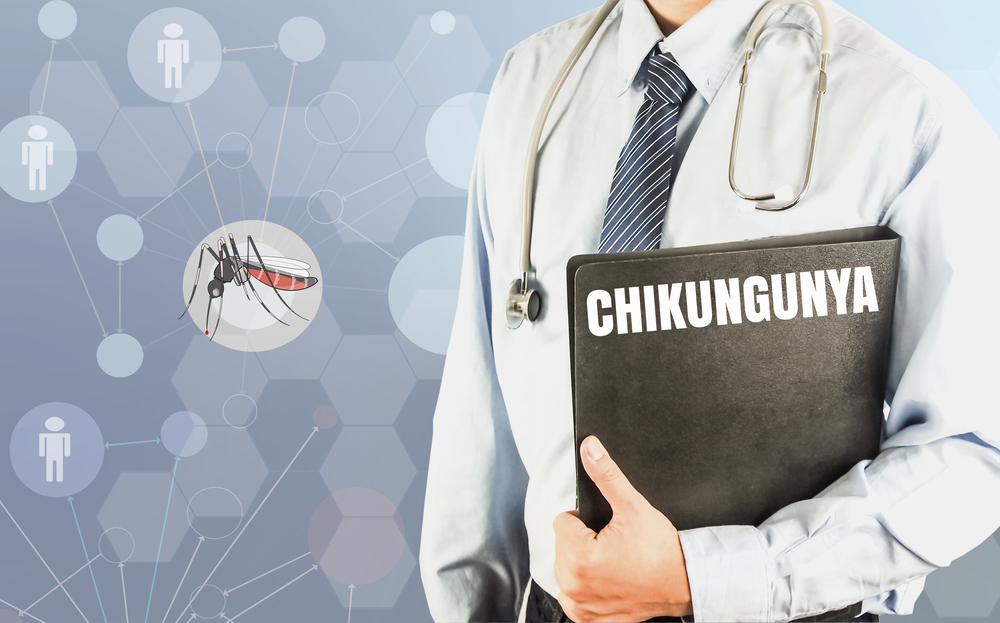Symptoms of Chikungunya – Its Diagnosis and Treatment

Chikungunya is a viral disease (genus Alphavirus) that is typically caused by the bite of Aedes mosquito. “Chikungunya’- the name originated from a verb in the Kimakonde language which basically means- ‘to become contorted.’ The virus of Chikungunya is said to exist in tropical regions only. But recently it has been reported that Chikungunya has infected many non-tropical regions of the Asia and Africa as well. Symptoms of Chikungunya must be taken seriously.
The infected Aedes mosquitoes typically breed in or around human habitations and prefer to feed on humans during the daytime in shady areas as well as in the evening. The infected mosquitoes cause sudden onset of fever and severe joint pain. Generally, the signs and symptoms of Chikungunya start to show up within two to seven days after being bitten by an infected mosquito.
Symptoms of Chikungunya
The signs and symptoms typically start with one or more of the following – chills, fever, vomiting, nausea, headache, joint pain, etc. There is also a high possibility that the fever may touch 100 to 104 degree Celsius. The attack is sudden, sometimes accompanied with rashes. However, in children, the infection causes no symptoms at all.
Some of the major physical symptoms of Chikungunya are as follows:
- Redness in the eye: This typically means that one is likely to suffer from conjunctivitis and face difficulty in looking towards the light.
- Headache: Frequent and severe headache is a common symptom of Chikungunya that may continue for days together at a stretch.
- Severe joint and body pain: This type of pain is frequent and keeps increasing as the days pass. Sometimes, the joints also get swelled up due to severe pain.
- Appearance of rashes usually on limbs and trunks: Symptoms of Chikungunya are also known to cause rashes on entire body which keep coming back frequently.
- Bleeding: The person suffering from this disease, is at a high risk of suffering from bleeding. Haemorrhage may occur at times too.
Some of the clinical symptoms of chikungunya seen in children are as follows:-
- Retro – orbital pain,
- Vomiting,
- Diarrhoea, and
- Meningeal syndrome.
Incubation period
The incubation period is basically the time frame wherein a person gets infected from the virus of Chikungunya and develops its symptoms. The period, after the bite, ranges from 1 to 12 days. However, its resulting fever, that typically onsets on Day 2 or 3 is said to significantly affect the person’s immune system. The virus is a fatal threat to aged people and can even cause paralysis, kidney & liver disorder, and cerebral problems amid them.
Similarly, children are also highly vulnerable to the occurrence of the initial symptoms like fever and body pain. Often it is seen that children are not capable of facing the symptoms of Chikungunya virus and eventually die of the disease.
Infectious Period
Infection period is basically the time frame during which an infected person can infect others. But it is important to know that Chikungunya is not a communicable disease, and spreads directly from a mosquito to a person.
Diagnosis and Treatment
Currently, there is no preventive vaccine available against Chikungunya. But looking at the situation and the potential threat for severe morbidity, there is a need for prompt, proper and accurate diagnosis and treatment. Some of the available tests include – Viral culture, serologic and polymerase chain reaction (PCR)-based tests, etc.
- Serum or plasma Test: Usually the laboratory diagnosis is accomplished by examining the patient’s serum or plasma to detect the virus, the viral nucleic acid or virus-specific immunoglobulin (Ig) along with neutralizing antibodies. The viral RNA of Chikungunya virus can also be identified in serum, during the initial first eight days of illness.
- Viral Culture: Viral Culture can also detect the virus in the first three days of the illness.
Treatment
There is no medicine or vaccination available for treating Chikungunya Virus. But some of the precautionary measures include:-
- Taking plenty of rest.
- Drinking ample amount of fluids to prevent dehydration.
- Taking medicines such as- Acetaminophen or paracetamol for fever and pain.
- The only method to counter the virus is to avoid being stung by mosquitoes, especially when traveling in areas where the disease is in a great amount.
- If one is in a situation of high risk of complications, such as- being pregnant or suffering from any serious medical problems, he/she must try to avoid visiting the places with an outbreak of Chikungunya.
Prevention
In order to prevent mosquito bites:-
- One must wear long or full sleeved shirts and pants before going out. If possible, apply permethrin, a type of insecticide to repel mosquitoes.
- A mosquito repugnant must be applied on the exposed parts of the skin, preferably one that contains DEET, picaridin, IR3535, oil of lemon eucalyptus or paramenthane-diol (PMD).These are some of the suggested ointments as they are highly effectiveness and stay for long.
- One should make sure that the windows and doors are duly locked. Also, it is suggested that one must use insecticide treated mosquito nets, not only at night but most importantly during the day time as it’s the time of the day when the chances of one being stung by an infected mosquito are the highest.
When should one visit a doctor?
One should visit a physician as soon as he/she feels the symptoms of Chikungunya are starting to show up. The doctor will suggest a series of tests to check for the presence of Chikungunya virus in the body and further diagnose a proper course of treatment.













